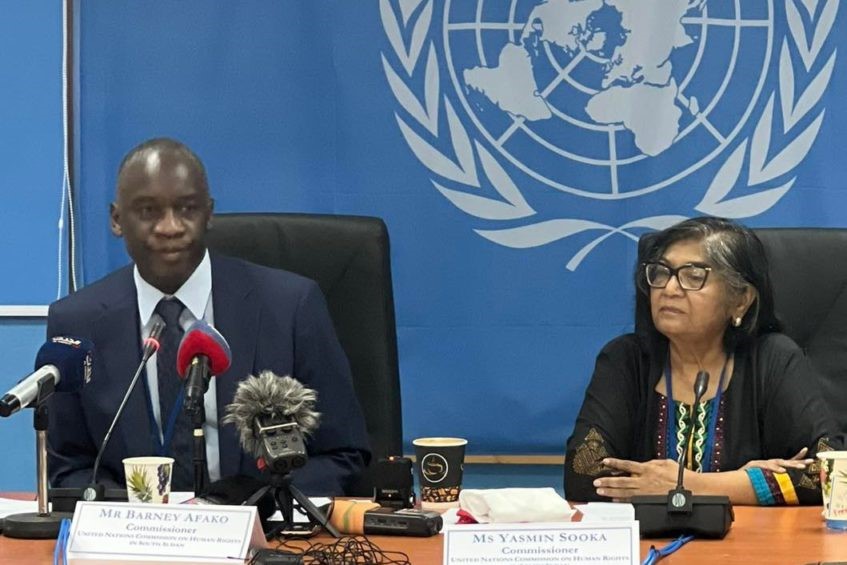By Kei Emmanuel Duku
United Nations Commission on Human Rights in South Sudan has urged the parties to the 2018 revitalized peace agreement to swiftly implement the extensive recommendations of the Judicial Reform Committee.
The UN said this action is crucial for investigating and prosecuting perpetrators of the December 2013 conflict in the country.
One of the key recommendations of the Judicial Service Commission is the formation of an independent court, free from executive interference. This is vital for restoring public confidence in the judiciary and ensuring fair trials.
In a report released over the weekend titled “The Unrelenting Cycle of Violence in South Sudan,” to mark the 11th anniversary of the conflict, one of the Commissioners, Carlos Castresana Fernandez stated that the December 2013 conflict has claimed countless lives, internally displaced millions, and forced others to seek refuge in neighboring countries, shattering the country’s social fabric.
He emphasized that for South Sudanese to enjoy peace and unity, leaders must address the root causes of the conflict, which encompass political, governance, social, and economic reforms.
He underscored the urgent need to establish local courts and strengthen the country’s justice systems to address post-conflict cases.
“Lack of accountability remains one of the most significant barriers to peace. Failing to end impunity is a failure of governance and leadership. The situation will not improve until there is a robust, independent national system of justice to address the crimes committed against the South Sudanese people,” said Fernandez.
The UN Human Rights Commission in South Sudan also accused the government of failing to protect its citizens, particularly women and girls.
The Commission urged government leaders to renew and redirect efforts and resources toward establishing holistic transitional justice processes to help eradicate the pervasive impunity that has plagued the lives of South Sudanese for the past 11 years.
The report further notes that without a genuine commitment from South Sudanese leaders to peace and justice, the country and the civilian population will struggle to overcome the impacts and legacies of the conflict.
Meanwhile, Barney Afako, the Commission’s Chair, stated that since the signing of the 2018 peace agreement, leaders who committed crimes during the December 2013 conflict continue to hold public positions with impunity, obstructing justice and exacerbating the suffering of the local population, fostering fear of violence, displacement, and death.
The Commission commended the government’s efforts in enacting legislation on the Commission for Truth, Reconciliation, and Healing, as well as the Compensation and Reparation Authority. However, since its enactment, there has been no progress in its functionality.
Afako urged the government to collaborate closely with the African Union to complete the pending tasks established in judicial service reforms.
“This must now be followed by urgent implementation, and engagement with the African Union to complete the process of establishing the Hybrid Court. The game of transferring responsibility for the failure to act on establishing this court must now end. Without a genuine commitment to accountability, peace, and reconciliation will remain elusive,” said Afako.
The report further described the situation in the country as deplorable, citing the major clauses in both the 2015 Peace Agreement and the 2018 Revitalized Agreement that remain unimplemented.
These unfulfilled agreements create fear of violence and ethnic conflict, which, if left unaddressed, can result in massacres, horrific sexual violence, extrajudicial killings, abductions, sexual slavery, exploitation, and abuse.
“It is devastating to witness how entrenched and cyclical the violence has become due to the failure to hold perpetrators accountable, including those identified by the Commission as having command responsibility.
Pervasive impunity has emboldened individuals to commit horrific crimes as they have no fear of retribution.
The demand from South Sudanese civilians is clear: they want justice and reparations for what they have suffered. They have waited far too long,” added Afako.
The report highlighted the need for holistic transitional justice processes, including criminal accountability, truth-telling, reparations, and transformative institutional reforms, to ensure the non-recurrence of violence and violations, and to break the ongoing cycle of violence.
A well-established and comprehensive transitional justice program will signal a shift in the values dominant in society.




